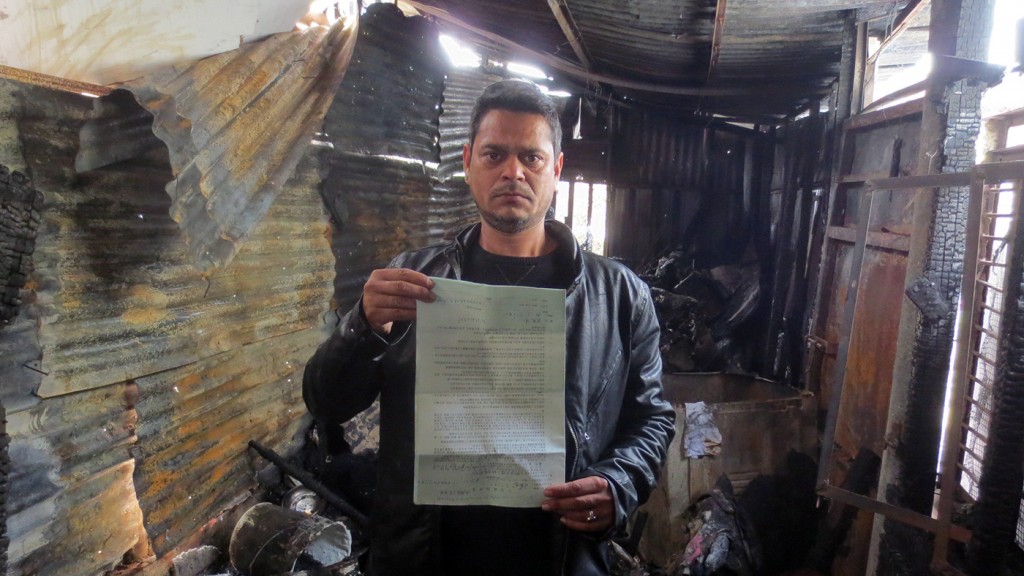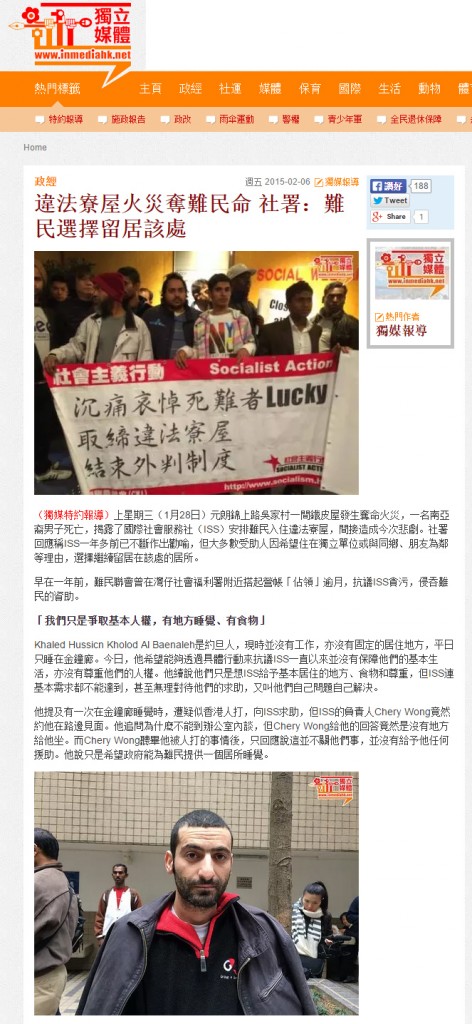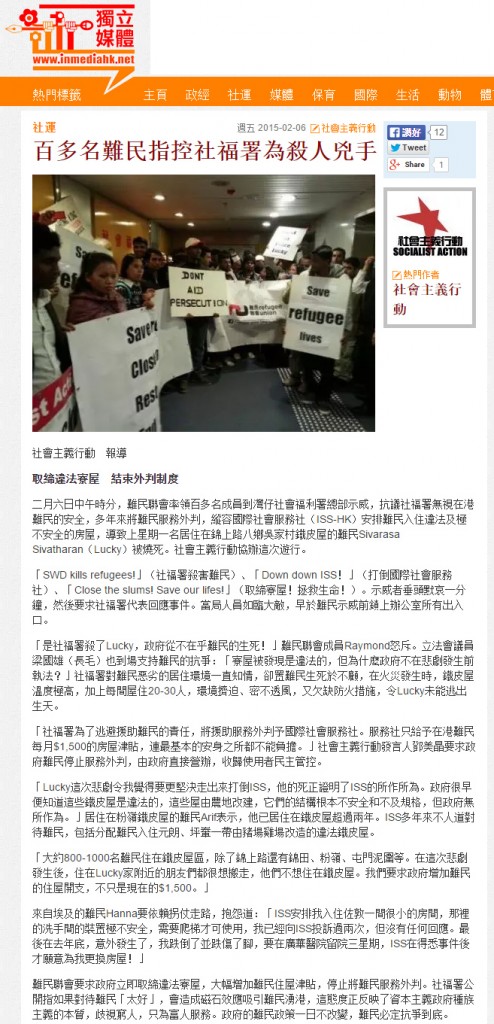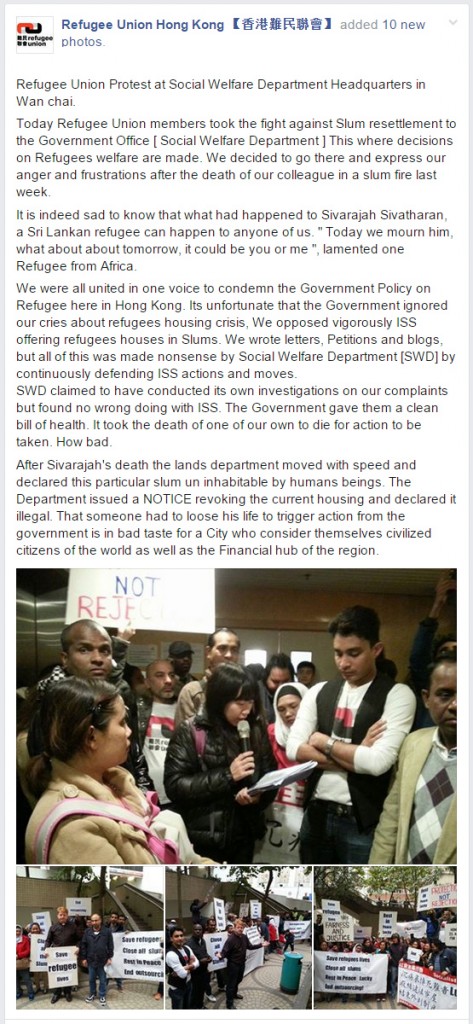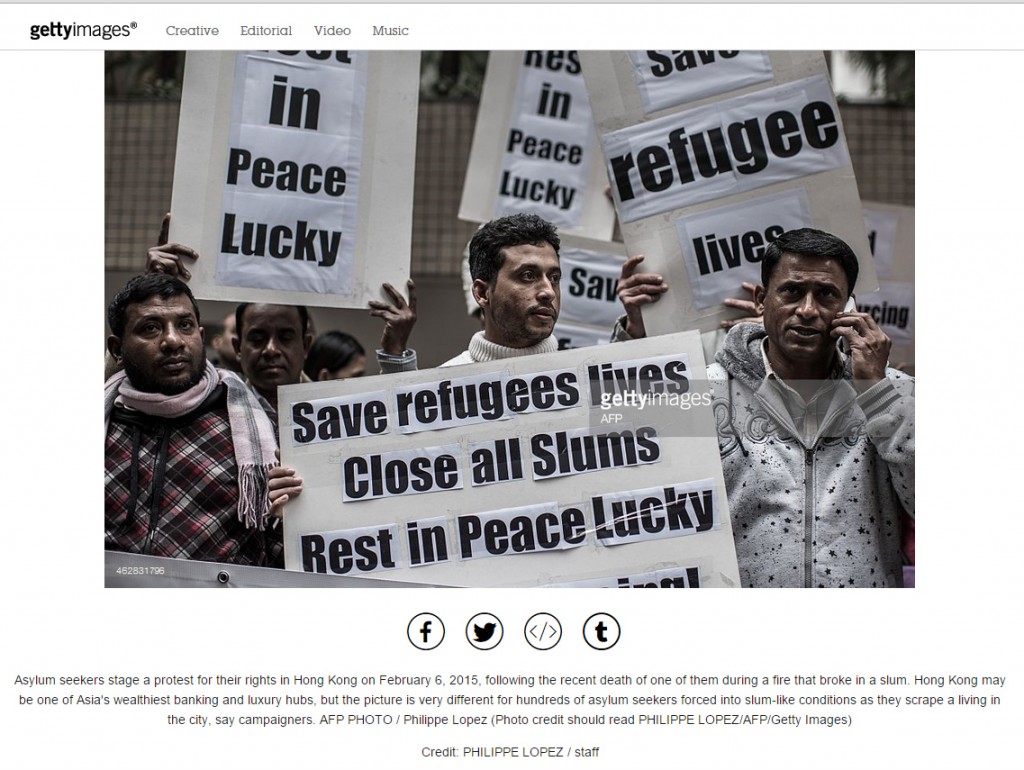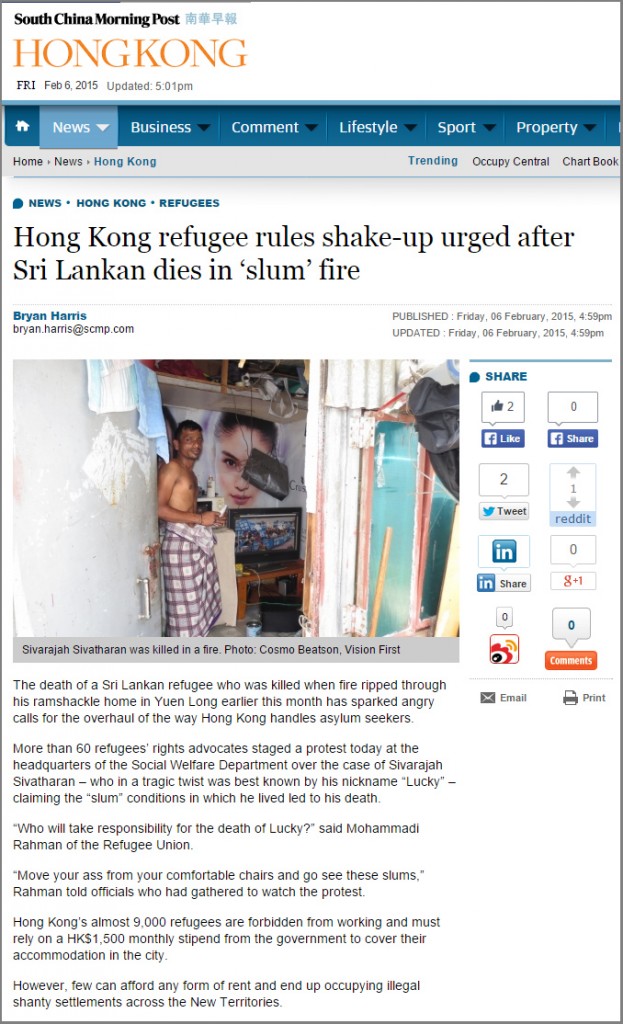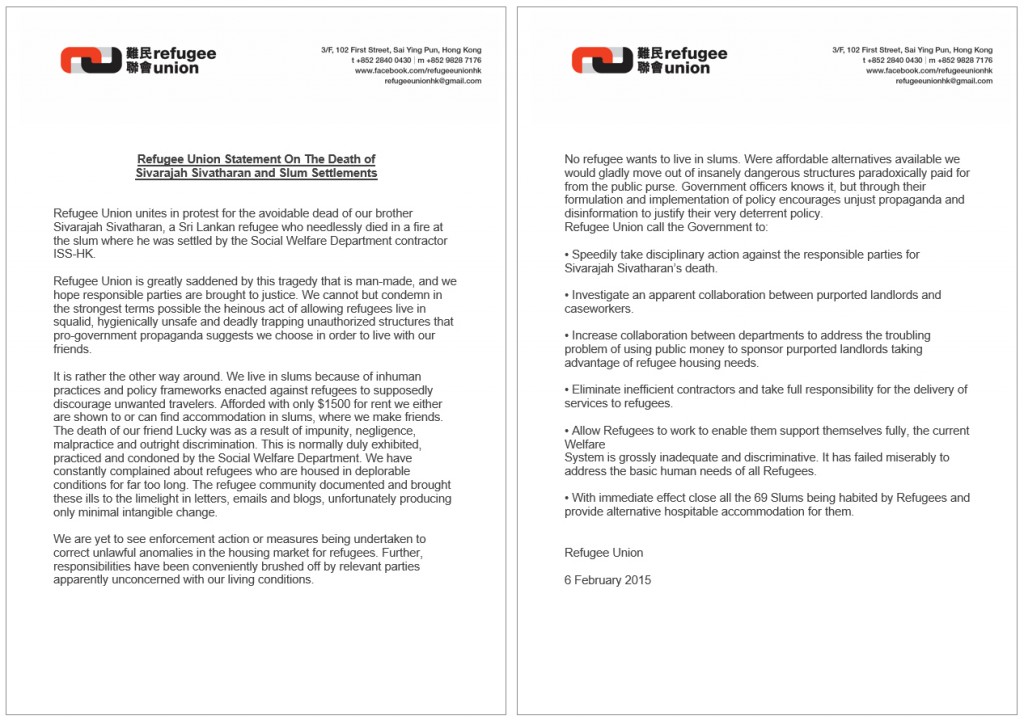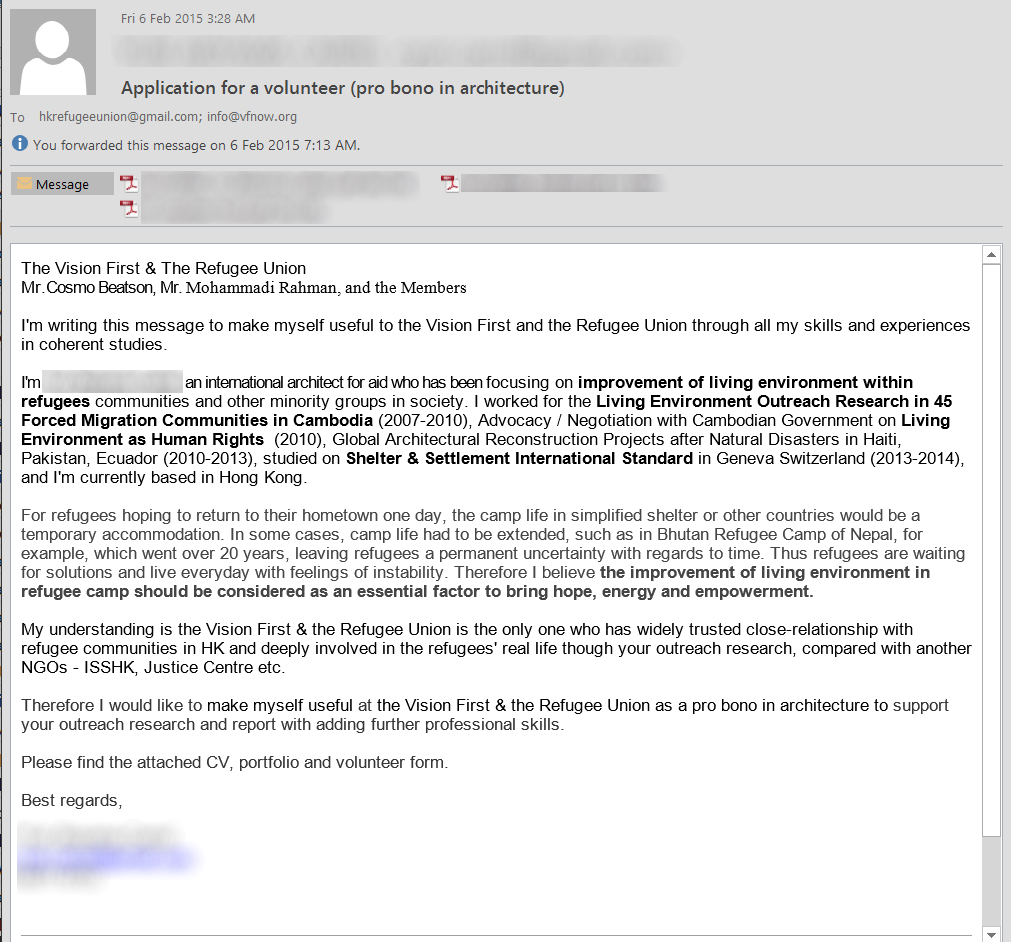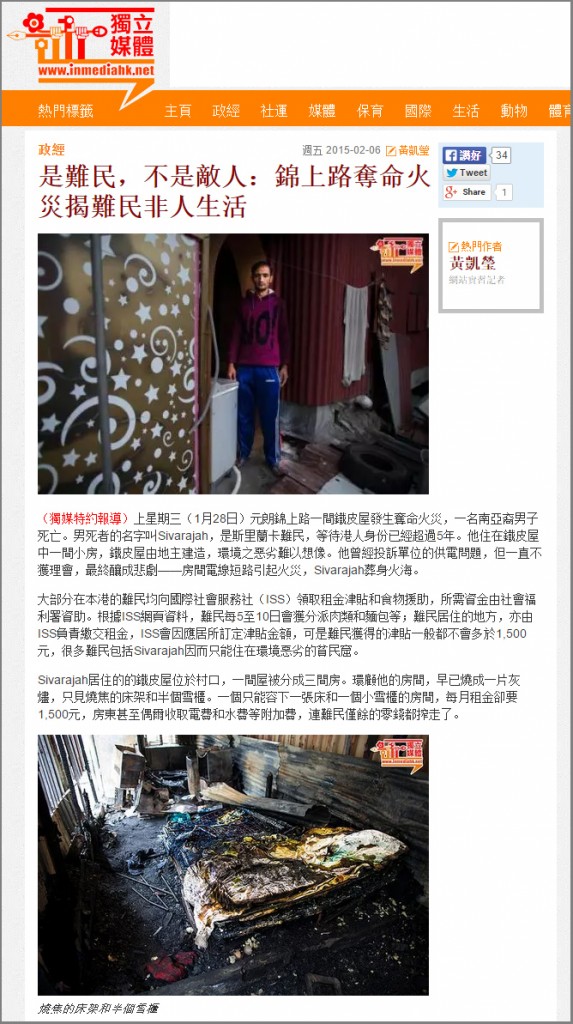RU urges government to abide by its own laws
Feb 7th, 2015 | Housing, Refugee Community, Welfare | Comment
Hong Kong refugee rules shake-up urged after Sri Lankan dies in ‘slum’ fire
Feb 6th, 2015 | Housing, Media, Welfare | Comment
Housing crisis expanding to guesthouses
Feb 6th, 2015 | Housing, Welfare | Comment
Vision First received worrying reports from many refugees settled in guesthouses across Hong Kong that they must leave their rooms and rent accommodation for 1500$ … or become homeless. It is estimated that perhaps 300 refugees have been housed in guesthouses over the past 18 months because housing prices spiraled beyond reach. Of course only a fraction of refugees received such preferential treatment.
While many refugees are settled in slums, those who are kicked out for several reasons, or refuse to be housed in such poor conditions are occasionally given alternative temporary accommodation. It seems that their times is up, despite unavailable alternatives other than the destitution that the International Social Service (ISS-HK) is contracted to prevent. A refugee who lives in Mirador Mansion despairs, “ISS knows there are no rooms but they are still kicking us out. Why?” It’s a legitimate question.
This week caseworkers were reported to have called scores of refugees saying payments will stop this weekend. Apparently refugees are asked to share rented accommodation, despite many finding this solution uncomfortable or impossible. A Srilankan refugee of 10 years with severe PTSD and clinical depression warned his case officer that he suffers night fears and cannot share with others.
Another refugee who suffered mental trauma was given till the end of February. He had this to say about the way he was (mis)treated, “My officer said I must move out quickly, quickly. He gave me agency numbers and asked me to call, but I cannot speak Chinese. The agencies hate refugees because we don’t have money and they cannot find rooms for 1500$ for us. I don’t want to leave the guesthouse and become homeless.”
Refugees report that those who have friends and could share a room, already did so, because guesthouses have a problem: refugees cannot cook the food they receive from the ISS-HK. Guesthouses have no cooking facilities. Forced cohabitation in cubicles may unsurprisingly lead to refugees getting impatient and angry with each other, possibly resulting in fights when what technically starts as a temporary arrangement becomes permanent.
The housing crisis has resulted in many guesthouses in Mirador Mansion and Chung King Mansions to be fully let to refugees sponsored by ISS-HK, we were told. It is unbelievable that before the slum crisis is resolved, another one appears to be brewing exacerbating the problems faced by the refugee community.
“Actually I cannot move,” warned an African refugee, “My planning is not to move and call the police if they try to touch my stuff. Where can I go?” Housing of refugees is becoming a matter of public security other than personal security. When will Hong Kong government formulate a viable, realistic policy?
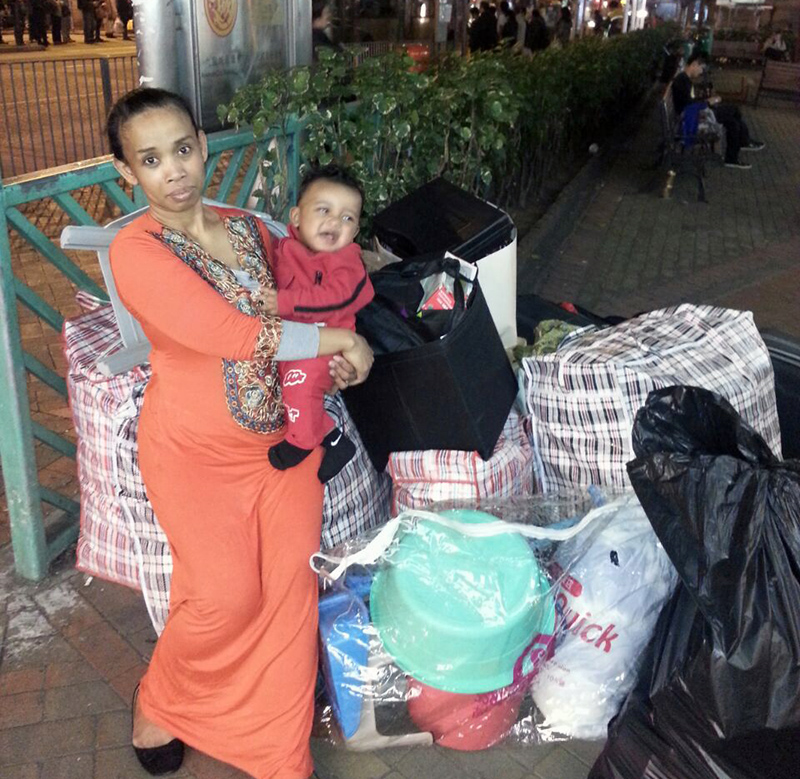
Refugee Union Statement following slum fire
Feb 6th, 2015 | Crime, Housing, Refugee Community, Welfare | Comment
I almost died in the slum fire
Feb 6th, 2015 | Housing, Personal Experiences, Welfare | Comment
I was a neighbour of Srilankan refugee Lucky who died in the slum fire on 29 January 2015. I lived in the second hut behind his and barely escaped the burning inferno alive. My name is Dillo and I am a member of the Refugee Union. I fled from India to save my life in 2008. This is my experience of International Social Service (ISS) and the hazards of illegal structure and the evil slum business.
At about 10am on that tragic day, I was asleep in my hut when the fire broke out. People knocked frantically on my door and woke me up. I took a great fright as the back wall of my room was starting to burn. I grabbed my mobile phone and ran outside while my hut and everything I possess burst into flames. It all happened so fast!
A huge fire was already burning inside and over the first two huts and was raging overhead with unbelievable heat and noise. The acrid smoke raced up to the sky turning it black. It was horrible to see the fire burn and crackle the metal sheets like plywood. Moments later my room was engulfed in a fireball and I thanked God the smoke didn’t chocked me before I escaped.
I covered my mouth and ran towards safety by the main road. At that time there was no police or firemen. They arrived about 30 minutes later. By then the fire was so huge that the huts could not be seen any more. Mia from Bangladesh had already come out of the second hut before me. We didn’t know what happened to Lucky who lived in the first one. He wasn’t outside. Anyone inside the flaming inferno wouldn’t be alive!
We lost a wonderful and cheerful friend. We also lost everything we possess: clothes, fridge, TV, a gold ring and bags of clothes my girlfriend stored in my hut. That night I slept in a friend’s room. The next day ISS put me in a guesthouse in Kam Tin, but for over two years my caseworker had settled me in a deadly tin-sheet hut.
On 22 September 2012 I moved into my hut and ISS paid the landlord continuously until January 2015. At the start the rent was 1500$. ISS paid 1200$ and I was compelled to work illegally to pay the surplus and utilities. Sometime in 2014 the rent increased to 1600$ and ISS paid the landlord 1500$ while I paid 100$. My girlfriend kept the tenancy agreements as I was afraid my hut was not safe. That is evidence of a trusting relationship between ISS and this slum lord.
My ISS caseworker (name withheld) confirmed the hut as my home in September 2012. He never inspected it. He never came to visit me. From September 2012 until the morning of the deadly fire, none of my ISS caseworkers ever visited my hut. When I asked the landlord for a copy of his ID card and bankbook, as routinely required by ISS, he said it wasn’t necessary because ISS knew him well.
From the day I moved into this slum I have been wondering: How does ISS believe where I am living? How do they approve places that they don’t inspect? Why do they trust the landlord to give us safe rooms to live? Some rooms have 3-4 refugees living inside, how can ISS understand this overcrowding without inspecting, without asking questions?
I never complained about the awful living conditions because I understood it was pointless. ISS don’t care and because they have relationship with the landlord they only trust him. They speak Chinese so when we have meeting together we don’t know what they agree. ISS approves everything for us.
Before we didn’t realize how dangerous living in huts was. We knew they were not safe, but we were afraid of rain and typhoon, not fires, because flooding is bad and there is electricity. I didn’t fear that I could burn in my sleep. Nobody thought the fire would be so violent. We understand that all is illegal inside, metal and wood sheets taken from landfills. But what choice do we have?
I am very proud of the Refugee Union as we spread the news so fast that our members arrived before the police. There had been fires in slums before, but the news never got outside. Two refugees died in two separate fires, but everyone kept it quiet. The victims were ISS clients. Some refugees still have photos of those fires and knew the deceased.
